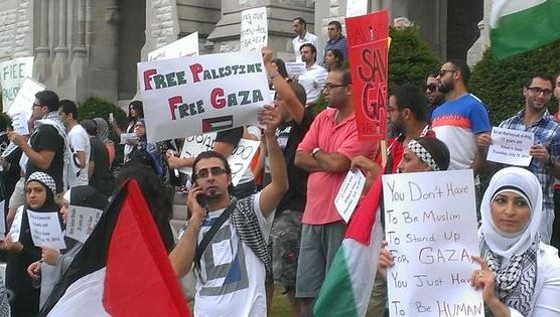Anyone who has sat through a rain-delayed baseball game can attest that there are times when, as the saying goes, the best laid plans go awry. But, as a group of student organizers and local activists learned Tuesday, plans can also go awry when the Missouri History Museum decides the issue of Palestine is too controversial to be handled at a public event.
The event in question, titled "Ferguson to Ayotzinapa to Palestine: Solidarity and Collaborative Action," was scheduled to run Thursday night and had been advertised as such for weeks on the museum's website. So organizers were surprised when museum officials abruptly changed their minds, demanding Palestine be removed from the event's program. The organizers refused.
"They gave us an ultimatum, either that we don't include Palestine or that we don't do the event. So at that point we said that we weren't going to do the event," Bradley Schlesinger, one of the event's organizers, told Washington University's Student Life.
See also: After Performing for Peace in Israel, Circus Harmony Brings Message of Unity to Ferguson
Along with the Missouri History Museum, the event's cohosts included Washington University student groups AltaVoz and Latinos en Axion STL, the Organization for Black Struggle and the Saint Louis Palestinian Solidarity Committee. According to the description of the event (which was removed from the museum website some time on Wednesday), the panel sought to address "parallels we can draw between issues in Ferguson, Ayotzinapa, and Palestine and what collaboration can look like moving forward."
The museum claims that the event did not originally include Palestine, and the change represented a break in the cohosting agreement between the museum and the activist groups.
"We were initially open to the changes and posted information about the program on our website," said the museum in a prepared statement. "However, after much consideration we decided the complexities of this issue could not be adequately addressed in this format."
The museum's statement included a copy of a February 1 email from AltaVoz member and Washington University senior Sourik Beltran. The email described an event called "Ferguson to Ayotzinapa: A Dialogue on Solidarity and Inter-Movement Collaboration." The email did not mention Palestine.
Missouri History Museum president Dr. Frances Levine tells Daily RFT she wasn't aware of the event until she saw the flier two days ago. She faults the museum's program staff for not fully vetting the event and its format, adding that she had doubts a student-run panel could meet the museum's high standards for moderated panel discussions.
"My staff usually has to justify how events relate to our programs and our mission, and I don't think the staff had really grappled with it," Levine says. "I recognized the complexity of the issue. Our staff couldn't describe to me adequately how this would function."
Levine says the museum is open to hosting a different Palestine-related event in the future.
See also: Missouri History Museum Collects Ferguson Protest Artifacts, Wants Your Donations
Granted, all three of the event's proposed subjects were complex: the kidnapping (and possible mass killings) of 43 students attending a teachers college in Ayotzinapa, Mexico, in September set off massive protests in that county and has shaken the administration of Mexican president Enrique Peña Nieto. The tension between Palestinians and Israel is steeped a century of violent conflict, and the prospect of peace took another hit this week with the re-election of right-wing prime minister Benjamin Netanyahu. Ferguson continues to be a divisive issue among St. Louisans, especially as the region wrestles with the wider challenges of fixing St. Louis County's exploitative municipal court system.
Still, it was the subject of Palestine that appeared to be too much for the museum.
"We could call it censorship, but it's a specific kind of censorship," says Washington University associate professor Bret Gustafson, one of the panelists for Thursday's now-canceled event. "I presume it has to do with the concern that talking about Palestine is somehow wrong."
Gustafson, who teachers anthropology and had planned on speaking about Ayotzinapa, believes museum officials were wrong to assume the event's organizers were incapable of thoughtfully addressing the links between Palestine, Ferguson and Ayotzinapa.
"We can draw some parallels between these cases, but clearly we should also point out the differences," Gustafson says. "I think what the students who organized this event were trying to do was highlight the parallels without trying to naively say that these are the same things."
In place of tonight's events, organizers plan to protest outside the Missouri History Museum tonight at 6:30 p.m.
Follow Danny Wicentowski on Twitter at @D_Towski. E-mail the author at [email protected]


